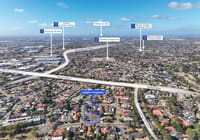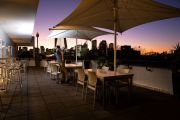
Major InterContinental expansion bolsters Salter Brothers’ ASX hopes
British hotelier IHG Hotels & Resorts will open luxury InterContinental properties in Melbourne, Canberra and Sydney and re-introduce its Regent brand after a two-decade absence in a major shake-up of the industry.
The company announced plans to rebrand a number of its lower-tier Crowne Plaza Hotels as part of a deal with Salter Brothers, the local fund manager that owns the properties and is preparing to float a $2 billion portfolio of accommodation assets on the ASX within 18 months.

London-listed IHG is one of the biggest hoteliers in the world and operates not only the InterContinental and Crowne Plaza brands but several others, including the luxury Kimpton chain and budget Holiday Inn properties.
Under the plan, the Crowne Plaza in the eastern Sydney suburb of Coogee will become an InterContinental by the end of the year, while Crowne Plaza Melbourne will become InterContinental Melbourne by 2030. In Canberra, the Crowne Plaza will also become an InterContinental.
The existing InterContinental in Melbourne is set to become a Regent Hotel, marking a return of the brand to Australia, more than 20 years since its last property was renamed. The Regent in Sydney, the country’s first five-star hotel, became the Four Seasons in 2002 after a change of ownership.
The deal with Salter Brothers comes amid a wave of luxury hotel openings. Among them Capella Sydney opened two years ago while the Waldorf Astoria is due open its doors on Sydney’s Circular Quay next year.
Matt Tripolone, Australasia Pacific managing director at IHG Hotels & Resorts, said it was time to reposition the five properties as customers demanded more luxury experiences that InterContinental offered.
“We understand that cities mature and develop over time,” Tripolone said on Wednesday. “Where these hotels are, the markets around it have changed to such an extent that now we believe a higher brand driving more premium product in those locations is the best outcome.”
Tripolone said the COVID-19 pandemic had created a big change in how travellers approached hotels, with visitors wanting more comforts than before.
“Whether they’re corporate travellers or whether they’re transient leisure travellers, there is a strong desire to, when they travel, to travel at a more elevated level than they used to,” he said. “Because they missed travel for so many years, it really solidified how important travel was to many people.”
Paul Salter, managing director at Salter Brothers, said there was a big move towards luxury lifestyle, including high-quality hotels and experiences.
“This is certainly leveraging that macro trend, and this is something that we’re seeing, across the world, not just in Australia, that people are prepared to spend money on,” Salter said. “All of the properties that we’re relaunching will have a big wellness element to them.”
The rebuilds and redevelopments, he said, would try to incorporate the daily habits of leisure and corporate travellers into the property. “One of the new builds, we’re going to put a lap pool in, so for people that want to continue they’re swimming when they’re travelling, they can do it,” he said.
Dean Dransfield, a long-time transactions and development adviser to hoteliers, said real estate had simply become more valuable.
“This is just classic property, highest and best use, not dissimilar to when Salter Brothers bought the Travelodge portfolio, and then they’ve progressively rebranded the hotels,” Dransfield said.
“When you have an opportunity to do a major refurbishment, one of the questions you’ve got to ask yourself is, do I upgrade the market position? The incremental cost of that is often not great. That’s probably the question that they’re saying, yep, in some of these cases, we can definitely do that.”
The redevelopment of these hotels into IHG’s luxury InterContinental brands follows a number of globally-renowned hotels making their mark in Australia, like the Waldorf Astoria and Capella in Sydney.
Dransfield said many brands have wanted to be in Australia and the nation’s hotel room rates have increased to a point where it’s now feasible to operate these types of hotels.
“It’s just a natural maturation of the market and increased wealth in the upper portions of the population,” he said. “It’s a place where people are happier spending their money now…it’s not a convenience item, it’s a luxury treat.”










